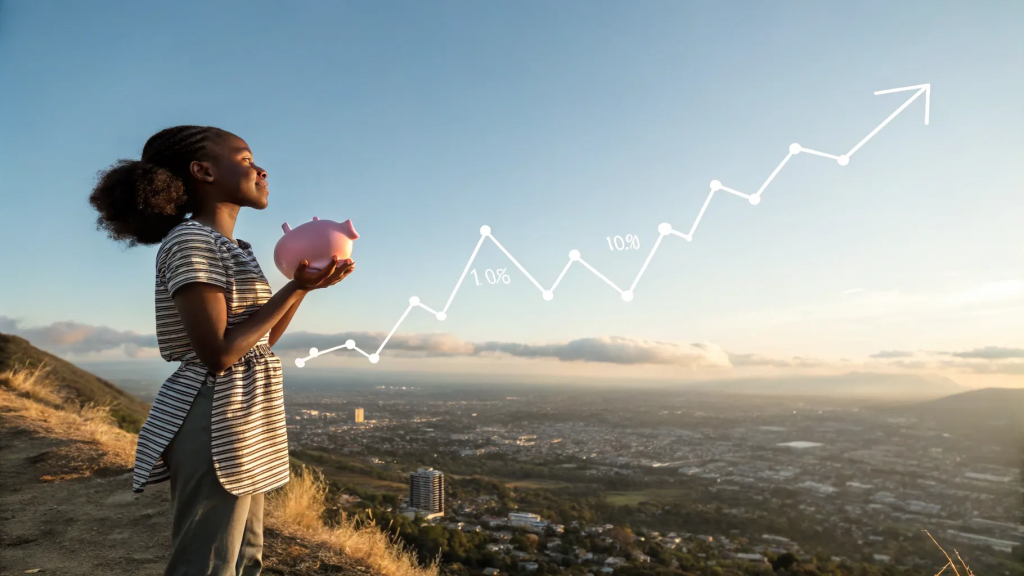The inflation is an inevitable part of our financial landscape, but that doesn’t mean we can’t protect our money from its effects. In this blog, let’s explore practical strategies to safeguard your finances against the inflation in Nigeria as an nigerian, ensuring your hard-earned money retains its value over time.
Understanding the Inflation in Nigeria
Inflation is a term we hear often, but what does it really mean? Simply put, inflation refers to the rise in prices of goods and services over time. This means that what you could buy for a certain amount of money today, you may need more money to buy the same thing in the future. It affects everyone, from shoppers at the market to business owners trying to manage costs.
In Nigeria, it can be particularly impactful as it influences the cost of basic necessities like food, rent, and transportation. Understanding how it works is essential in order to protect your money.
Why Does Inflation in Nigeria Happen?
Several factors contribute to inflation, and they can vary from one country to another. Here are the main causes:
- Demand-Pull Inflation: This occurs when the demand for goods and services exceeds their supply. For instance, if many people want to buy a particular product but there aren’t enough available, prices will rise.
- Cost-Push Inflation: This happens when production costs increase, leading businesses to raise prices to maintain profit margins. For example, if the cost of raw materials goes up, manufacturers may pass that cost onto consumers.
- Money Supply: When a central bank prints more money without a corresponding increase in goods and services, it leads to inflation. More money in circulation can diminish the value of each naira.
Types of Inflation in Nigeria
It can be categorized into different types based on its causes and effects. Understanding these types can help you navigate your financial decisions better.
1. Creeping Inflation
This is a slow and gradual increase in prices, typically around 1% to 3% per year. While it can be manageable, it still erodes purchasing power over time.
2. Walking Inflation
Walking inflation occurs when prices rise more significantly, usually between 3% to 10% annually. This level of inflation can start to affect everyday spending and savings.
3. Galloping Inflation
When inflation exceeds 10%, it is considered galloping inflation. This can lead to financial instability and is often a sign of economic trouble. Prices can skyrocket, making it difficult for families to afford basic needs.
4. Hyperinflation
This is an extreme form of inflation where prices rise uncontrollably, often exceeding 50% per month. Countries experiencing hyperinflation can see their currencies become nearly worthless, leading to significant economic hardship.
How Inflation in Nigeria Affects Your Money
Inflation impacts your finances in several ways, and recognizing these effects is crucial for effective financial planning.
1. Reduced Purchasing Power
As prices rise, the value of your money decreases. This means that the same amount of money will buy fewer goods and services over time. For example, if you could buy a loaf of bread for 200 naira today, that same loaf might cost 250 naira next year.
2. Impact on Savings
If your savings are not earning interest that outpaces inflation, you’re effectively losing money. For instance, if you have 100,000 naira in a bank account earning 2% interest while inflation is at 5%, your real purchasing power has decreased.
3. Effect on Fixed Incomes
For those relying on fixed incomes, like pensions, inflation can be particularly challenging. If your pension remains the same while prices rise, you may find it increasingly difficult to cover your living expenses.
4. Increased Costs of Living
Inflation leads to higher costs for essentials like food, housing, and transportation. If your income doesn’t increase at the same rate as inflation, you might struggle to maintain your standard of living.
5. Investment Returns
Investments need to outpace inflation to grow your wealth. If your investments yield a return lower than the inflation rate, you will lose money in real terms. This is why it’s important to choose investment options wisely.
The Impact of Inflation in Nigeria on Consumers and Savers
Inflation affects us all, but its impact varies between consumers and savers. For consumers, the most obvious effect is the rising cost of goods and services. When inflation hits, the money in your pocket buys less than it did before. You might notice this when shopping for groceries or filling up your car. What used to cost you 5,000 naira might now set you back 7,000 naira for the same items.
Savers feel the pinch as well. If your savings account offers low interest rates, it may not keep up with inflation. This means that over time, the real value of your savings diminishes. For example, if you have 100,000 naira saved and inflation is at 7%, the purchasing power of that money is effectively reduced. You are not just losing money; you are losing your ability to afford what you could previously buy with that amount.
Inflation in Nigeria: Consumer Experience
As a consumer, the impact of inflation is immediate. You feel it every time you go shopping. Prices of everyday items rise, and you may have to make tough choices about what to buy. This can lead to stress and anxiety as you try to balance your budget.
Inflation in Nigeria: Saver Experience
For savers, the challenge is more subtle but equally significant. If your savings don’t grow at a rate higher than inflation, you’re effectively losing money. It’s like watching your money shrink while it sits in the bank. This realization can be disheartening, especially if you’re saving for important goals like education or a home.
Strategies to Protect Your Money from Inflation in Nigeria
Now that we understand the impact of inflation, let’s explore practical strategies to protect your money from inflation. While you can’t completely eliminate the effects of inflation, you can take proactive steps to mitigate its impact.
1. Invest in Growth Assets
One of the most effective ways to protect your money is to invest in assets that grow over time. This includes stocks, real estate, and mutual funds. These investments have the potential to generate returns that outpace inflation.
2. Diversify Your Portfolio
Diversification is key to reducing risk. Don’t put all your eggs in one basket. Spread your investments across different asset classes to maximize returns. This way, if one investment underperforms, others may compensate for it.
3. Increase Your Income Streams
Consider finding additional sources of income. This could be through side hustles, freelance work, or even investing in a small business. Increasing your income can help you keep pace with rising prices and protect your purchasing power.
4. Stay Informed
Knowledge is power. Keep yourself updated on inflation trends and economic forecasts. Understanding the financial landscape will help you make informed decisions about where to put your money.
5. Review Your Budget Regularly
Regularly reviewing your budget is essential. Look for areas where you can cut back on unnecessary expenses. This way, you can redirect funds toward investments that will protect your money from inflation.
6. Consider Inflation-Protected Securities
Some financial instruments are designed to protect against inflation. Look into government bonds or treasury inflation-protected securities (TIPS). These can provide a safeguard for your investments against rising prices.
7. Build an Emergency Fund
An emergency fund is crucial in times of inflation. It offers a financial cushion that can prevent you from dipping into your investments during tough times. Aim to save at least 3 to 6 months’ worth of expenses in a liquid account.
Conclusion
Inflation is a reality that we must all face, but it doesn’t have to derail your financial plans. By understanding its impact and implementing strategies to protect your money from inflation, you can minimize its effects on your finances. Remember, the goal isn’t to eliminate inflation but to outsmart it.
Invest wisely, diversify your income, and stay informed about economic trends. With these strategies in place, you can maintain your purchasing power and ensure that your hard-earned money continues to work for you in the long run. By taking proactive steps today, you can secure a more stable financial future for yourself and your family.
I have 13 years of experience in customer service at one of Brazil’s largest banks, including 5 years as a general branch manager. I am a specialist in banking products and services with a proven track record in team leadership and business development. I am also a holder of Brazilian certifications CPA-10 and CPA-20.



